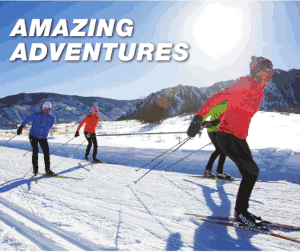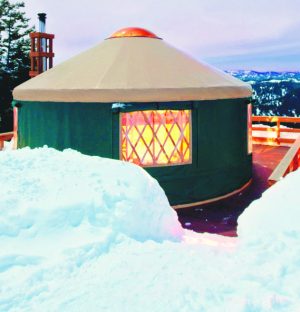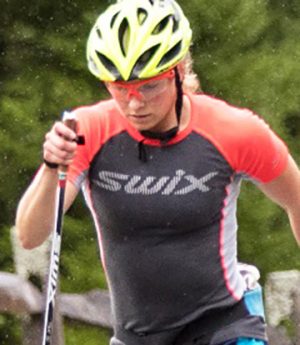January 09, 2018 (Anchorage, Alaska) – Caitlin Patterson finished her special four-race performance at the 2018 L.L.Bean U.S. National Cross Country Ski Championships at Kincaid Park on Monday the way she started it Wednesday – by blowing the doors off the competition. Monday’s late and dramatic come-from-behind win in the women’s classic sprint final capped Patterson’s run of four National titles in four races over six days.
Reese Hanneman, originally of Fairbanks and now of Anchorage, swept both 2018 Nationals sprint events with his men’s classic sprint win Monday. He edged APU teammate Tyler Kornfield by .2 seconds to earn his fourth Nationals sprint title – two freestyle, two classic.![Reese Hanneman celebrates his victory in the men’s classic sprint final [P] Michael Dinneen Photography](http://skitrax.com/wp-content/uploads/2018/01/Hanneman-copy-1.jpg)
“It’s hard to put into words,” said Patterson, who leaves Anchorage a six-time National champion. “Amazing. Beyond what I could have imagined.”
Her Craftsbury Green Project Racing coach, Pepa Miloucheva wasn’t surprised, though, saying, “She worked hard for this and she deserves this. It’s her Nationals.”
Patterson’s younger brother, Scott, is a pretty decent skier in his own right – a multi-time National champion whose dominant 15K freestyle win on Wednesday matched his sister’s big opening win in the women’s 10K freestyle earlier that day. Even he was impressed, and humbled, by his sibling’s week.
“It’s been pretty incredible to see, and she’s rubbed it in all week,” he said, smiling.
She arguably saved her best for last. In Monday’s 1.4K classic sprint final, she was two ski-lengths behind University of Denver’s Jasmi Joensuu in the final downhill with just 200 meters to go. Using tactics she gathered from earlier heats, her familiarity of that stretch of Kincaid Park’s trails from her high school and juniors racing days, and some vicious double-poling, Patterson quickly overtook and then dusted Joensuu. Patterson came across the line with both poles pumping in the air, winning by two seconds (3 minutes and 39.58 seconds to Joensuu’s 3:41.94).“When I passed her, I felt like I carried more momentum,” Patterson said. “And I got out of there as fast as I could.”
Not bad for a skier who claimed that she’d never won a big sprint race before this week. When asked if she’s a sprinter now, she smiled and said, “I guess so.”
Her brother Scott’s been a believer for a long time. He said, “She’s such a killer finisher. When I saw her two ski-lengths back (on the final downhill), I thought, ‘Oh, that’s (Nationals title) No. 4.’”
The Pattersons are South Anchorage High School grads and former members of the local Alaska Winter Stars ski program. After this Nationals, both are hopeful to be teammates at the 2018 Winter Olympic Games.
When asked if she’d heard from anyone about earning a spot on the national team roster, she laughed and said, “Nope, not yet – I’m still waiting. I’m optimistic.”
Perhaps she’ll hear later this week when she returns to the World Cup circuit, starting in Germany. At the latest, she’ll know when the Olympic team nominations are announced the week of January 23.
Hanneman is hopeful for his own ticket to Pyongyang, South Korea. He certainly beefed up his resume this week. First, he put up Friday’s freestyle sprint win. Then Monday morning, he clocked the day’s fastest classic sprint qualifying time, gaining him critical Olympic Winter Games points that are among the many factors considered in determining national teams.Then Hanneman muscled his way through a gauntlet of hungry skiers in the quarterfinals, semifinals and final rounds. His biggest roadblock to the win was Kornfield, a tall sprinting stud with two classic sprint National crowns (2010 and 2012) and momentum from his exciting – and somewhat unexpected – win in Sunday’s 30K classic mass start.
In Monday’s final, Hanneman and Kornfield broke away from a tight pack on the last major hill climb and speedy downhill of the 1.6K course. It was Hanneman who popped up first into the 100-meter flat stretch to the finish line, with Kornfield behind him in the same tracks. As both double-poled furiously, Hanneman stayed just far enough ahead to negate Kornfield’s frantic finishing move. The win was decided by the length of a ski pole handle, Hanneman clocking 3:20.62 to Kornfield’s 3:20.82. The rest of the finalists were nearly five seconds behind.
“I couldn’t let off at all,” Hanneman said. “Tyler is cranking right now; impressive skiing by him all week. It definitely motivated me to just drive that thing so hard in the final. … It was awesome.”
Kornfield, as thoughtful as he is competitive, said, “We’re at a point where Reese and I just kinda nod heads before the final and we know that it’s me against him now. Sometimes it’s hard to be racing your teammates but like any training session, we just go hard, try to race clean, race fair, and go as hard as you can. And Reese had it today. I was trying to catch him in the end and didn’t quite have that last push. But it was a lot of fun.”
The week’s events were extra fun for the host state and its Nordic ski community, clubs and training groups – all eight of the National titles were won by Alaskans or skiers with Alaska roots.
Monday morning’s dramatic ice fog and cold lifted for a clear and sunny three rounds of classic sprint heat racing in the afternoon. All skiers competed in the morning’s qualifier, hitting the course one at a time in 15-second intervals. The 30 fastest qualifiers advanced to the quarterfinals, which is where the madness started – five heats each featuring six racers. The top two finishers in each heat advanced to the semifinals, as did the two fastest quarterfinal racers who didn’t land a top two finish (called “Lucky Losers”). The top two finishers in each of the two six-person semifinals along with two more Lucky Losers advanced to fill out the six-person finals.
Monday’s hill-filled sprint courses mirrored the crazy-quick loop used in Friday’s freestyle sprints. The men skied a 1.6K course; the women, 1.4K. The course started at the south end of Kincaid’s stadium and immediately took a sharp, steep right to gain the top of the wild and winding Gong Hill area, which led to the chilly Frog Pond, briefly back near the stadium, and then to a sharp left on the backside of the Gong Hill. There, the women turned to the stadium while the men made an extra 200-meter loop before reaching the stadium. A big, sweeping turn and gradual uphill led skiers to a flat 100-meter straightaway and the finish line.
Find a full schedule – race days and off-days here.
Women’s results here.
Men’s results here.
This week’s races crowned National champions and determined roster spots on the FIS Junior World Championship, U23 Championship and U18 Scandinavian Cup teams. While primary selection for the 2018 Olympic Cross Country Team comes from World Cup races, some final spots can be determined from Nationals results.
For recaps and photos from the 2018 Nationals events, visit:
Official website: here
Facebook: here
Instagram: here
Twitter: here






![National camp action [P]...](https://skitrax.com/wp-content/uploads/2019/08/Duluth-4-2019-08-08-at-10.46.51-AM-300x246.png)
![Matt Liebsch on the CXC Elite Team [P] CXC...](https://skitrax.com/wp-content/uploads/2019/08/Matt-Liebsch-CXC.2-525x700.4-300x267.jpg)
![Dan LaBlanc [P]...](https://skitrax.com/wp-content/uploads/2019/08/Dan-LaBlanc-img_1855.3.jpg)

![Caitlin Patterson approaches the finish line to win the women’s classic sprint final [P] Jim Jager](http://skitrax.com/wp-content/uploads/2018/01/Patterson-copy-1.jpeg)
![Women's podium (l-r) Joensuu 2nd, Patterson 1st, Miller 3rd [P] Michael Dinneen Photography](http://skitrax.com/wp-content/uploads/2018/01/WOMENS-PODIUM-copy-4.jpg)
![Men's podium (l-r) Kornfield 2nd, Hanneman 1st, Saxton 3rd [P] Michael Dinneen Photography](http://skitrax.com/wp-content/uploads/2018/01/MENS-PODIUM-copy.jpg)